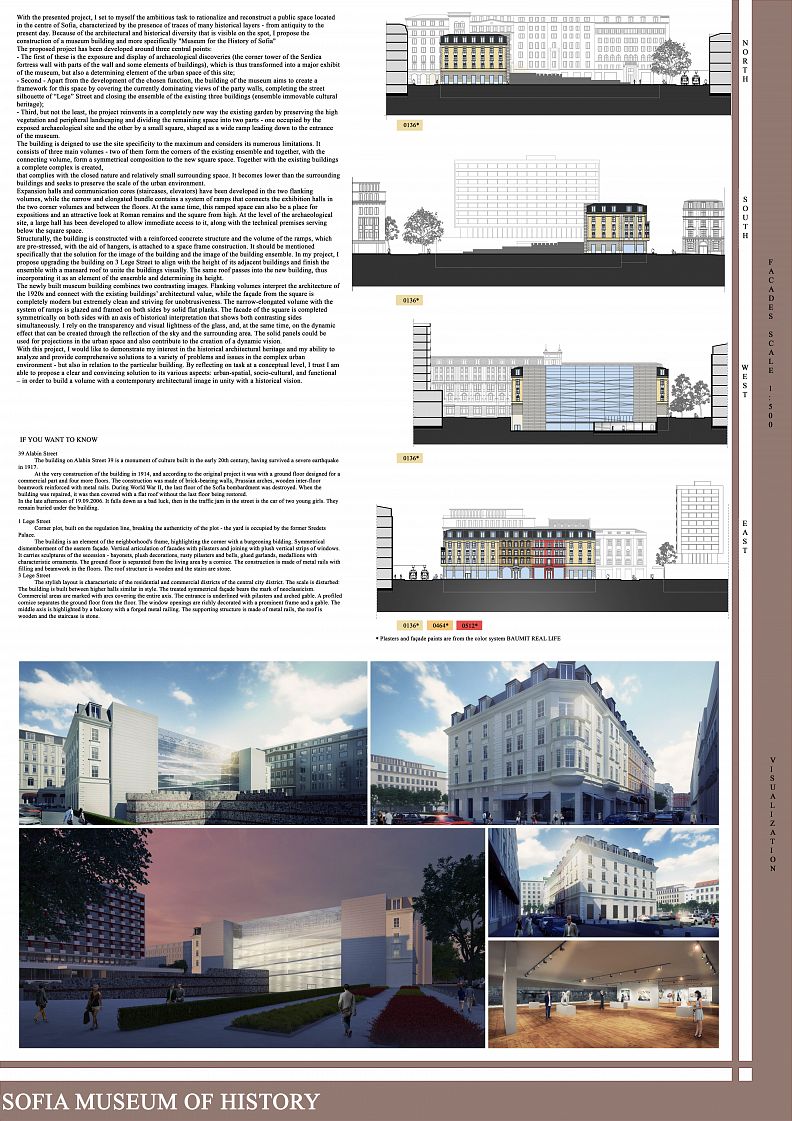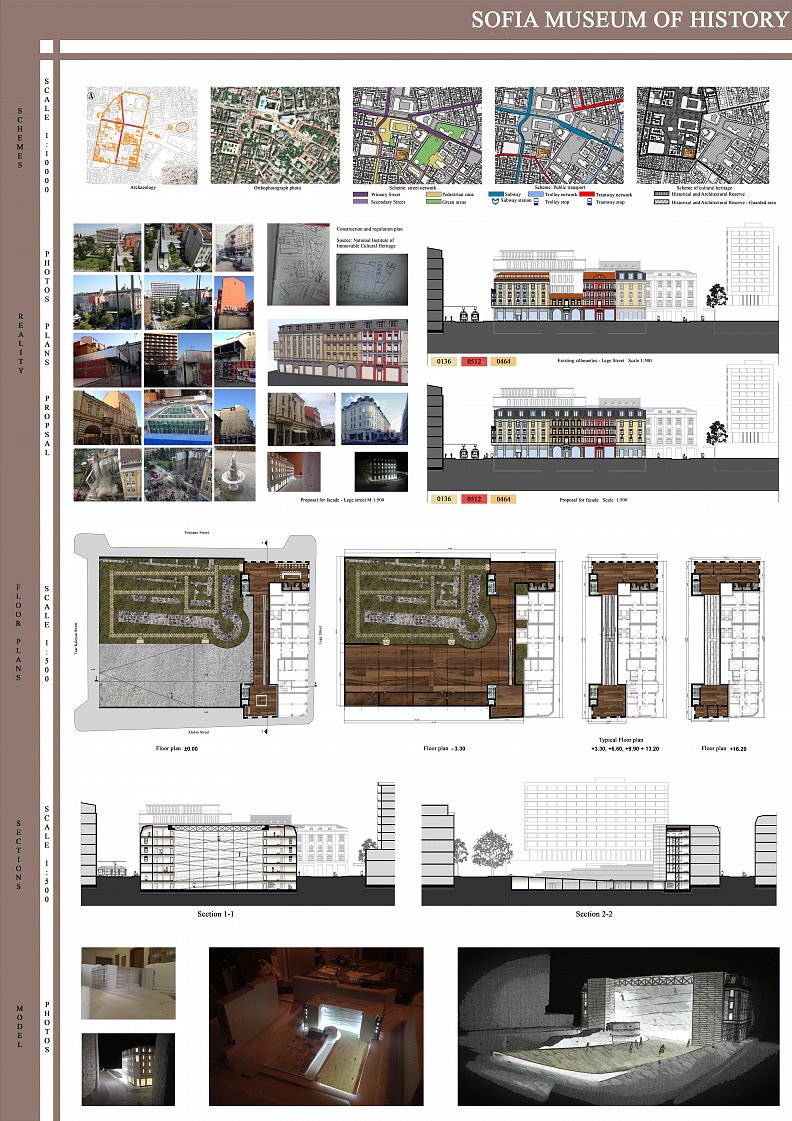Sofia Museum of History

Project idea
the central city part of Sofia is characterized by the presence of traces of many historical layers - from antiquity to the present day. The project aims to demonstrate both my interest in the historical architectural heritage and my ability to analyze and solve a complex set of problems and issues of a very varied nature in the complex urban environment but also in relation to the specific building. There are three main points in the project: the first is the revelation and exhibition of archeology, namely the corner tower of the Serdica fortress wall with part of the wall and elements of buildings; The second point is the very building of the museum, which, besides developing the chosen function, aims to create a framework for this space, covering the dominant views at the moment - mud, completing the street silhouette on Lege Street and closing the ensemble of the existing three buildings Part of the city's immovable cultural heritage. The third point is to reconstruct the existing garden in a completely new way, preserving the high vegetation and landscaping mainly on the periphery, and the remaining space divided into two - one part occupied by the exposed archeology and the other by a small square, representing a wide ramp , Leading down to the museum. The newly built museum building combines two contrasting images. Flanking volumes interpret architecture from the 20s of the twentieth century and make connection with existing buildings architectural value, while the façade from the square is completely contemporary but extremely clean and striving for unobtrusiveness.
Project description
With the presented project, I set to myself the ambitious task to rationalize and reconstruct a public space located in the centre of Sofia, characterized by the presence of traces of many historical layers - from antiquity to the present day. Because of the architectural and historical diversity that is visible on the spot, I propose the construction of a museum building and more specifically "Museum for the History of Sofia"
The proposed project has been developed around three central points:
- The first of these is the exposure and display of archaeological discoveries (the corner tower of the Serdica fortress wall with parts of the wall and some elements of buildings), which is thus transformed into a major exhibit of the museum, but also a determining element of the urban space of this site;
- Second - Apart from the development of the chosen function, the building of the museum aims to create a framework for this space by covering the currently dominating views of theparty walls, completing the street silhouette of “Lege” Street and closing the ensemble of the existing three buildings (ensemble immovable cultural heritage);
- Third, but not the least, the project reinvents in a completely new way the existing garden by preserving the high vegetation and peripheral landscaping and dividing the remaining space into two parts - one occupied by the exposed archaeological site and the other by a small square, shaped as a wide ramp leading down to the entrance of the museum.
The building is deigned to use the site specificity to the maximum and considers its numerous limitations. It consists of three main volumes - two of them form the corners of the existing ensemble and together, with the connecting volume, form a symmetrical composition to the new square space. Together with the existing buildings a complete complex is created,
that complies with the closed nature and relatively small surrounding space. It becomes lower than the surrounding buildings and seeks to preserve the scale of the urban environment.
Expansion halls and communication cores (staircases, elevators) have been developed in the two flanking volumes, while the narrow and elongated bundle contains a system of ramps that connects the exhibition halls in the two corner volumes and between the floors. At the same time, this ramped space can also be a place for expositions and an attractive look at Roman remains and the square from high. At the level of the archaeological site, a large hall has been developed to allow immediate access to it, along with the technical premises serving below the square space.
Structurally, the building is constructed with a reinforced concrete structure and the volume of the ramps, which are pre-stressed, with the aid of hangers, is attached to a space frame construction. It should be mentioned specifically that the solution for the image of the building and the image of the building ensemble. In my project, I propose upgrading the building on 3 Lege Street to align with the height of its adjacent buildings and finish the ensemble with a mansard roof to unite the buildings visually. The same roof passes into the new building, thus incorporating it as an element of the ensemble and determining its height.
The newly built museum building combines two contrasting images. Flanking volumes interpret the architecture of the 1920s and connect with the existing buildings’ architectural value, while the façade from the square is completely modern but extremely clean and striving for unobtrusiveness. The narrow elongated volume with the system of ramps is glazed and framed on both sides by solid flat planks. The facade of the square is completed symmetrically on both sides with an axis of historical interpretation that shows both contrasting sides simultaneously. I rely on the transparency and visual lightness of the glass, and, at the same time, on the dynamic effect that can be created through the reflection of the sky and the surrounding area. The solid panels could be used for projections in the urban space and also contribute to the creation of a dynamic vision.
With this project, I would like to demonstrate my interest in the historical architectural heritage and my ability to analyze and provide comprehensive solutions to a variety of problems and issues in the complex urban environment - but also in relation to the particular building. By reflecting on task at a conceptual level, I trust I am able to propose a clear and convincing solution to its various aspects: urban-spatial, socio-cultural, and functional – in order to build a volume with a contemporary architectural image in unity with a historical vision.
Technical information
Structurally, the building is constructed with a reinforced concrete structure and the volume of the ramps, which are pre-stressed, with the aid of hangers, is attached to a space frame construction. It should be mentioned specifically that the solution for the image of the building and the image of the building ensemble. In my project, I propose upgrading the building on 3 Lege Street to align with the height of its adjacent buildings and finish the ensemble with a mansard roof to unite the buildings visually. The same roof passes into the new building, thus incorporating it as an element of the ensemble and determining its height.















